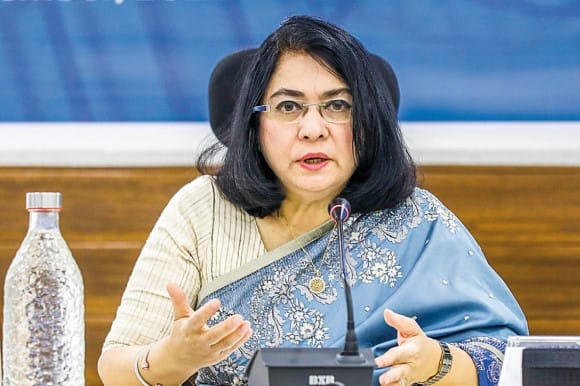Bangladesh’s export sector could incur losses of up to $8 billion annually in the absence of preferential tariff benefits after the exit from LDCs group, estimates the Centre for Policy Dialogue (CPD).
In a shadow parliamentary debate on Saturday, the independent think tank also said Bangladesh is likely to face a reduction in development aid for climate financing, adding that local businesses are not ready to face the graduation challenges.
“The economic data provided during the previous government’s tenure was politically motivated and misleading. Bangladesh had been one of the most prominent users of economic data for political purposes, with the Bangladesh Bureau of Statistics (BBS) being directed to produce manipulated data,” CPD Executive Director Dr Khatun further told the event organised by the Debate for Democracy at the capital’s FDC on Saturday.
She emphasised that post-graduation, Bangladesh would need to take loans at commercial rates, which would be difficult to repay, and noted that compliance with China’s loan terms remained unclear, in contrast to the more transparent terms of loans from other countries.
She cautioned against falling into the debt trap, pointing out that the last 15 years had seen significant waste, corruption, and mismanagement of borrowed funds, leaving no realistic repayment plans in place.
Hassan Ahmed Chowdhury Kiran, Chairman of Debate for Democracy, expressed concern over the government’s readiness for LDC graduation, questioning whether Bangladesh’s status as a developing country was based on false data.
He pointed out that the previous government had inflated economic achievements, using incorrect, exaggerated, and false information to present a distorted view of progress. Issues such as national reserves, GDP, export earnings, poverty reduction, food production, child marriage, and even the actual population figures were misrepresented during the previous administration.
He mentioned that the Bangladesh Bureau of Statistics (BBS) had been pressured to release data in accordance with the government’s preferences, with former Finance Minister Abul Maal Abdul Muhith calling the BBS data “bogus” at one point.
He also noted that the government had wasted public funds on lavish foreign roadshows under the guise of official business trips, while hiding the true extent of non-performing loans in the banking sector.
He criticised a small group of politicians, bureaucrats, and businessmen who, in collaboration with the government, had brought the country’s economy to the brink of collapse.
Kiran warned that the current global economic and political situation, coupled with the internal economic issues faced by Bangladesh—such as the financial sector’s irregularities, energy crises, high inflation, rising interest rates, declining foreign direct investment (FDI), and lack of private investment—could make it difficult for Bangladesh to navigate the challenges of LDC graduation by 2026.
However, he also pointed out that there is still over a year and a half to prepare for this transition, and with proper planning, it could enhance the country’s international stature, attract foreign investment, increase opportunities for setting up new industries, create more jobs, and boost internal revenue.
In the shadow parliament debate titled: “Is the Current Government on the Right Path to Tackle LDC Graduation Challenges?”, the debaters from Shaheed Suhrawardy Medical College triumphed over the team from Noakhali Science and Technology University.
The judges of the competition included Professor Abu Muhammad Rais, Dr Sheikh Mohammad Zubaid Hossain, Dr S M Morshed, journalist Mainul Alam, and journalist Md Touhidul Islam.

